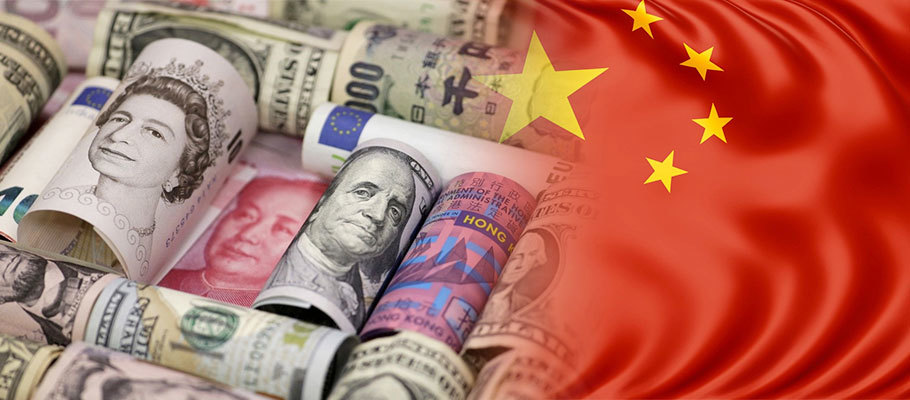
Published: January 12th, 2021
Between November and December 2020, China's forex reserves shot up by more than US$ 38 billion or 1.2% to stand at US$ 3.22 trillion. This increase is the highest since April 2020. However, China's portfolio of U.S. Treasury securities has dipped to its lowest since January 2017. The Orient nation is planning to dramatically optimize its forex reserve strategy in the wake of uncertain external conditions.
The South China Morning Post can now report that China is moving towards a forward-looking investment strategy to manage its vast foreign exchange reserves. The plan that Chinese authorities are proposing seeks to optimize the forex portfolio dynamically. These strategy changes come even as forex reserves rose to a four-and-a-half-year high.
According to the State Administration of Foreign Exchange (SAFE) statement, the agency that manages much of the country's reserve assets, there is increasing concern from Beijing about international unpredictability. Some of the issues that are troubling the country's leadership include the outlook of the world's economic recovery, the quantitative easing measures that most western nations have adopted, and financial turmoil that they might spawn.
China is also worried about the potential challenges that might arise with the U.S. president-elect Joe Biden's incoming administration.
The SAFE statement said that China would do more to improve its foreign reserve management. The report, which also summarized the agency's work priorities for 2021, added that China will proactively make strategic allocations and dynamically improve its investment portfolios.
The statement added that while the agency will stick to the rules, it will do everything possible to safeguard foreign exchange assets' value, security, and liquidity.
China's foreign exchange reserves rose by almost US$40 billion or nearly 1.5% between November and December 2020. The country's reserves now stand at more than US$3.3 trillion, the highest since April 2016.
According to SAFE's data, the country's reserve assets increased by US$108.6 billion, or 3.5% year-on-year. China hardly publishes the constitution of the reserve holdings, preferring to regard them as a state secret. However, it is believed that the country has significantly reduced its U.S. dollar asset holdings as part of the comprehensive diversification strategy.
SAFE's most recent report indicates that U.S. dollar assets made up about 60% of the reserves in 2015, unchanged from the previous year. Assuming the country has have maintained a similar spread since then, its U.S. dollar assets would be worth slightly under US$2 trillion now.
However, the U.S. Treasury data shows that U.S. Treasuries in China's hands have tanked for the fifth consecutive month in October to stand at US$1.054 trillion, the lowest in four and a half years.
The U.S. has held widespread speculation that its Oriental counterpart could blackmail it by disposing of the assets to retaliate the trade, finance, and technological restrictions Washington has imposed in the past 24 months.
However, most analysts hold that Beijing might not opt for this suicidal attempt as it would hurt not only the U.S. but also China and the world's financial system. That fact notwithstanding, market analysts support the prospect of China diversifying its reserve assets to decrease the amount of U.S. Treasury securities it holds.
According to Tan Yaling, the China Forex Investment Research Institute chief executive, a research group based in Beijing, the proportion of U.S. dollar-dominated assets making up China's foreign exchange reserves is too vast. It is only reasonable to modify the overall portfolio, she added.
She did not rule out China's chances of using the U.S. Treasury securities as a missile against the United States. However, she thinks the most probable route for Beijing is to use the same as bargaining chips in trade negotiations with Washington.
Tan said that China does not have the incentive to dump the U.S dollar-dominated assets deliberately. However, Beijing can use them to show its muscle by renewing investments when the securities come of age.
As tensions between the world's two largest economies rage on, both the Chinese authorities and the markets watch out for signals from the U.S. president-elect, who will be sworn in on January 20.
Zheng Yongnian, a senior Chinese don who heads the Advanced Institute of Global and Contemporary China Studies, a think tank based in Shenzhen, warned that banking on China-U.S. relations would improve because of the Biden presidency is misplaced. Instead, he said Beijing should brace for stricter restrictions from Washington.
He urged Beijing to watch out for any chance to mend relationships with Washington and make the most of any such whenever they present themselves.
On her part, Tan said that unless China and the U.S. substantially bring down the tensions between them, the U.S. Treasury securities remain the right choice for China because of their safety, liquidity, and impressive yield.
Wang Chunying, the SAFE deputy director, said the U.S. dollar's steady drop was responsible for the steep increase in China's foreign exchange reserves in December.
However, Wang said that tanking of the dollar is not the only reason, adding that a sustained increase in the price of global assets also contributed. Wang said an outlook of the global economic situation paints a complicated and severe picture.
She noted that the risks that the health pandemic has presented could not be ignored. She added that such risks now present many uncertainties and clear dangers for the international markets. Overall, she pointed out that the portion of China's foreign exchange reserves will remain steady.
China is planning to optimize its strategy for its massive foreign exchange reserves dynamically. According to the country's foreign exchange regulator, it is vital to take such steps to address concerns about international uncertainties. Beijing is worried about the rate of global economic recovery and the possibility of a market financial meltdown.